
The Roman historian and senator Tacitus referred to Jesus, his execution by Pontius Pilate, and the existence of early Christians in Rome in his final work, Annals, book 15, chapter 44.
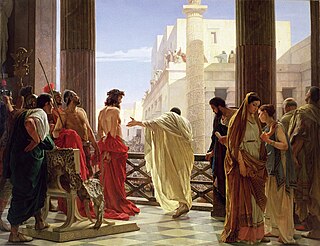
Pontius Pilate was the fifth governor of the Roman province of Judaea, serving under Emperor Tiberius from 26/27 to 36/37 AD. He is best known for being the official who presided over the trial of Jesus and ultimately ordered his crucifixion. Pilate's importance in Christianity is underscored by his prominent place in both the Apostles' and Nicene Creeds. Because the gospels portray Pilate as reluctant to execute Jesus, the Ethiopian Orthodox Tewahedo Church believes that Pilate became a Christian and venerates him as both a martyr and a saint, a belief which is historically shared by the Coptic Church, with a feast day on 19 or 25 June, respectively.
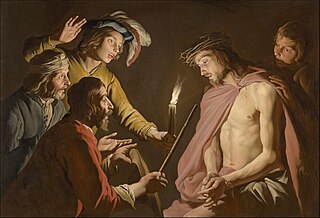
The Passion is the short final period before the death of Jesus, described in the four canonical gospels. It is commemorated in Christianity every year during Holy Week.
The historicity of Jesus is the question of whether Jesus historically existed. The question of historicity was generally settled in scholarship in the early 20th century. Today scholars agree that a Jewish man named Jesus of Nazareth did exist in the Herodian Kingdom of Judea and the subsequent Herodian tetrarchy in the 1st century AD, upon whose life and teachings Christianity was later constructed, but a distinction is made by scholars between 'the Jesus of history' and 'the Christ of faith'.
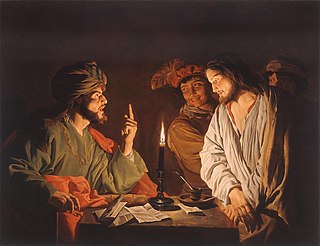
Josef Ben Caiaphas, known simply as Caiaphas in the New Testament, was the High Priest of Israel during the years of Jesus' ministry, according to Josephus. The Gospels of Matthew, Luke and John indicate he was an organizer of the plot to kill Jesus. He famously presided over the Sanhedrin trial of Jesus. The primary sources for Caiaphas' life are the New Testament, and the writings of Josephus. The latter records he was made high priest by the Roman procurator Valerius Gratus after Simon ben Camithus had been deposed.
The unnamed wife of Pontius Pilate appears only once in the Gospel of Matthew (27:19), where she intercedes with Pilate on Jesus' behalf. It is uncertain whether Pilate was actually married, although it is likely. In later tradition, she becomes known as Procula or Procla and plays a role in various New Testament Apocrypha. At a later date, she acquires the name Claudia Procula in Western tradition, as well as other names and variants of these names. She is venerated as a saint by the Eastern Orthodox Church, the Eastern Catholic Church, the Coptic Church, and the Ethiopian Church. She has also frequently been featured in literature and film.
Theophilus is the name or honorary title of the person to whom the Gospel of Luke and the Acts of the Apostles are addressed. It is thought that both works were written by the same author, and often argued that the two books were originally a single unified work. Both were written in a refined Koine Greek, and the name θεόφιλος ("Theophilos"), as it appears therein, means friend of God or (be)loved by God or loving God in the Greek language. The true identity of Theophilus is unknown, with several conjectures and traditions around an identity. In English Theophilus is also written "Theophilos", both a common name and an honorary title among the learned (academic) Romans and Jews of the era. The life of Theophilus would coincide with the writing of Luke and the author of the Acts.

Paula Fredriksen is an American historian and scholar of early Christianity. She held the position of William Goodwin Aurelio Professor of Scripture at Boston University from 1990 to 2010. Now emerita, she has been distinguished visiting professor in the Department of Comparative Religion at the Hebrew University of Jerusalem, since 2009.
Nemesius of Emesa was a Christian philosopher, and the author of a treatise Περὶ φύσεως ἀνθρώπου or De natura hominis. According to the title of his book, he was the Bishop of Emesa. His book is an attempt to compile a system of anthropology from the standpoint of Christian philosophy; it was very influential in later Greek, Arabic and Christian thought.

John 18:38 is the 38th verse in chapter 18 of the Gospel of John in the New Testament of Christian Bible. It is often referred to as "jesting Pilate". In it, Pontius Pilate questions Jesus' claim that he is "witness to the truth".

Barry Dennen was an American actor and writer. He is best known for playing Pontius Pilate on the original recording and later in the film of Jesus Christ Superstar.

Matthew 27 is the 27th chapter in the Gospel of Matthew, part of the New Testament in the Christian Bible. This chapter contains Matthew's record of the day of the trial, crucifixion and burial of Jesus. Scottish theologian William Robertson Nicoll notes that "the record of this single day is very nearly one-ninth of the whole book".
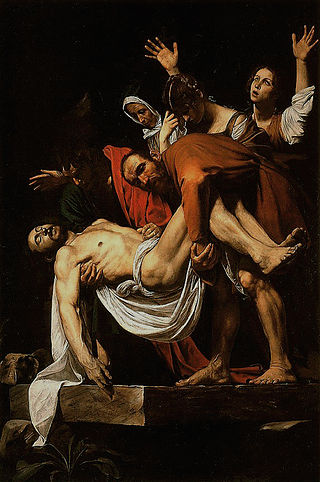
In the New Testament, the Sanhedrin trial of Jesus refers to the trial of Jesus before the Sanhedrin following his arrest in Jerusalem and prior to the trial before Pontius Pilate. It is an incident reported by all three Synoptic Gospels of the New Testament, while the Gospel of John refers to a preliminary inquiry before Annas. The gospel accounts vary on a number of details.

Matthew 27:2 is the second verse of the twenty-seventh chapter of the Gospel of Matthew in the New Testament. Jesus has been condemned by the Jewish Sanhedrin, and in this verse is handed over to Pontius Pilate.
"Son of Man" is a British television play by playwright Dennis Potter which was first broadcast on BBC1 on 16 April 1969, in The Wednesday Play slot. An alternative depiction of the last days of Jesus, Son of Man was directed by Gareth Davies and starred Northern Irish actor Colin Blakely. The play was shot on videotape over three days on a very limited budget: Potter was later to say that the set "looks as though it's trembling and about to fall down."

Jerusalem's role in first-century Christianity, during the ministry of Jesus and the Apostolic Age, as recorded in the New Testament, gives it great importance, both culturally and religiously, in Christianity. Jerusalem is generally considered the cradle of Christianity.
Deicide is the killing of a god. The concept may be used for any act of killing a god, including a life-death-rebirth deity who is killed and then resurrected.

In the canonical gospels, Pilate's court refers to the trial of Jesus in praetorium before Pontius Pilate, preceded by the Sanhedrin Trial. In the Gospel of Luke, Pilate finds that Jesus, being from Galilee, belonged to Herod Antipas' jurisdiction, and so he decides to send Jesus to Herod. After questioning Jesus and receiving very few replies, Herod sees Jesus as no threat and returns him to Pilate.
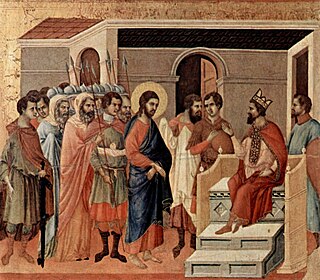
Jesus at Herod's court refers to an episode in the New Testament which describes Jesus being sent to Herod Antipas in Jerusalem, prior to his crucifixion. This episode is described in Luke 23.
The Nicene Creed, composed in part and adopted at the First Council of Nicaea (325) and revised with additions by the First Council of Constantinople (381), is a creed that summarizes the orthodox faith of the Christian Church and is used in the liturgy of most Christian Churches. This article endeavors to give the text and context of English-language translations.













